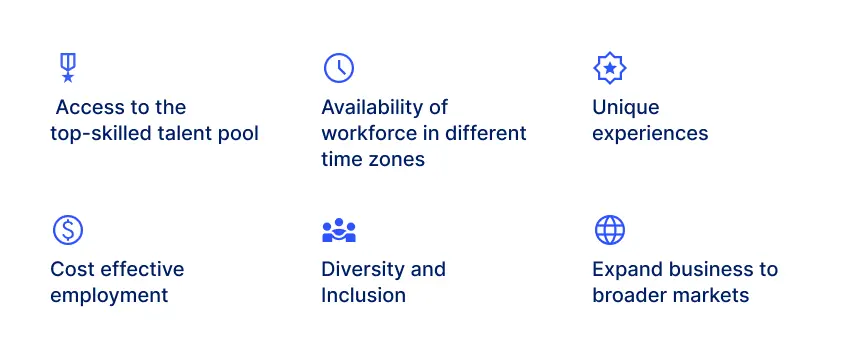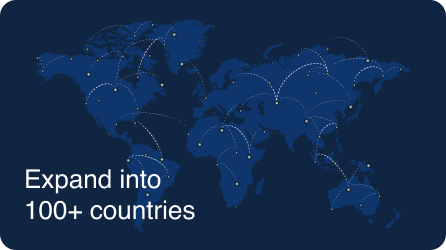Global teams refer to the workforce working on a particular business in different geographical locations. International businesses utilize these dispersed employees with unique skills to work for them and bring successful outcomes.
In the current period of diversity, equity, and inclusion, having global teams enriches the work culture and, at the same time, helps businesses bring in the right talent for the right jobs.
Why have global teams?
For any organization, big or small, it is an asset to have employees from diverse locations for the immense benefits they bring in. However, quite often, we miss on what are the real benefits of having a global team.
Now that you are aware of the benefits the global teams bring, let’s quickly learn ways of effectively managing a global team.
Top 11 ways of managing a global team
Smooth Onboarding
According to Brandon hall group, 86% of employees who participated in a survey believed that great employee onboarding improves retention rate tremendously. Many consider smooth onboarding the best way to keep employees happy and satisfied on joining a company. It is recommended to design the onboarding process in such a way that the new employee feels welcomed and enjoys the global standard practices of onboarding. Ensure your global team members experience a smooth onboarding and thus help in creating an excited and productive team ready for action.
Clear communication
Communication is crucial in global teams. Some of the ways of establishing clear communication includes:
- Exchanging thoughts through regular team meetings and video conferences;
- Summarizing the topics and sending meeting minutes to team members to ensure they understand it in the intended essence.
- Documenting meetings and keeping record of conversations accessible to anyone on the team.
Clarity is paramount in working together as a team; clear communication can bring clarity to the recipients. Encouraging open, transparent communication, along with considering language barriers, can help you develop an effective team.
Shared goals and expectations
Establish shared goals and expectations for the global team to create a sense of ownership and accountability. Circulating a documented version of the goals will help the team members to get familiarized with the core targets.
Also, team leaders can have one-on-one meetings with the team members to share feedback and the company’s expectations for them. By creating a hierarchy and by defining roles, responsibilities, and performance metrics for each team member, you can ensure that they understand their individual and collective contributions to the team’s objectives.
Flexibility and adaptability
Global teams often face challenges related to time zones, cultural differences, and work practices. By being flexible and adaptable to the needs and perspectives of employees, you are helping to create an inclusive environment and foster teamwork.
Some instances of ensuring flexibility and adaptability involve:
- Ensuring flexible working hours
- Scheduling meetings considering the time zones of team members
- Celebrating different cultural festivals together as a team
All these activities bring in a sense of belonging among the team members.
Building trust
Trust is essential for successful global team management. It would be best to cultivate trust among team members through regular communication, mutual respect, and recognition of each member’s contributions. As a factor capable of establishing positivity and productivity, trust is regarded as a crucial element in any working relationship.
- Usually, the HRs of companies organize icebreaker activities when a new employee joins. Though this seems fun, it is actually a trust-building exercise among the employees. One such activity is “Two Lies and One Truth. The new employee must tell the team two lies and one truth about oneself. The rest of the group will figure out which one of those is the truth. The game is very much in practice among remotely working global teams.
Project management tools
Utilize technology tools to facilitate collaboration and productivity. Digital tools like Trello, Click-up, and Jira can help coordinate and carry out projects on time. These virtual management tools help global teams work seamlessly across the continents.
- Effective cross-departmental collaboration
- Easy resource allocation for a particular project
- Set a hierarchy for various tasks
- Convenient progress monitoring of tasks
- Time-bound completion of assignments
Choose the right tools that suit the team’s needs and train the team members to use them effectively.
Payroll management
Another factor contributing to employee satisfaction among global teams is proper payroll management. It ensures smooth handling of the financial compensation for employees and independent contractors.
With employees from different parts of the world, an efficient payroll system is highly in demand to ensure payments are made on the right day. It needs to follow the regional employee benefits and compensation rules. In addition, sufficient preparations are necessary for paying the compensation in the local currency of the employees.
Conflict resolution
Address conflicts and issues proactively and in a timely manner. Provide a platform for team members to express concerns, provide feedback, and constructively resolve conflicts. Encourage open and honest communication and provide support in finding mutually beneficial solutions.
Compliance to labor laws
It is a pivotal factor in managing teams spread across the globe. Every country has its own rules and regulations stating employee benefits and other compensations. To handle and make a global team work, it is important to ensure the team members get their benefits without fail.
Let’s take an example and see how the compliance labor laws differ among nations.
Consider an employee working in the United States and another in Germany.
| The United States of America | Germany | |
| Payroll | The payroll cycle in the USA is Biweekly or Monthly, depending on the state-federal legal rules of the employer. | According to German Statutory laws, the payroll cycle is Monthly. |
| Minimum wage | The minimum wage followed in the USA is $7.25 per hour. | The minimum wage in Germany is 12 EUR* per hour. |
| Overtime pay | According to the Fair Labor Standards Act (FLSC), overtime pay is at least one and one-half times the employee’s normal rate of pay after 40 hours of work in a workweek. | The standard working hours in Germany are 8 hours per day and 48 hours per week. Overtime pay is to be determined by the employer. |
| Employee benefits |
|
|
| Employee payroll tax contributions |
|
|
* (around $13.25 per hour, as of April 2023).
**California, Hawaii, New Jersey, New York, Puerto Rico, and Rhode Island
As an operational factor to encourage employees to put their best into their work, lawful benefits have a significant position in the lives of global employees.
- Recognition and rewards: Recognizing and appreciating the efforts and achievements of team members is a game changer in boosting employee productivity. Also, providing feedback and offering rewards is a great way to inspire the team. This can help raise team morale and motivation, and foster a positive team dynamic.
- Leadership: Effective leadership is essential in managing a global team. As a leader, always try to provide clear direction, support, and feedback to team members. Entrust your team with the responsibility to make decisions, take ownership of work, and encourage them to contribute their ideas and expertise. The team should be able to view the scope for professional opportunities through the leadership experience you provide.
Develop a global team with Multiplier
Are you still compromising with talent pool availability?
Well, have a broader view and see the immense possibilities diverse talents can bring for your team’s success. Greater productivity and lower employment costs are two strong factors that can make or break your business, and that is clearly the outcome of investing in a global team.
Multiplier, a SaaS-based EOR provider, can help manage your global teams with smooth onboarding, efficient payroll management, ease up visa formalities, pay employees in their regional currencies, maintain compliance with regional labor laws, and many more.
Focus on implementing better business strategies rather than breaking your head over lengthy operational proceedings. Enjoy running your business with Multiplier on your side. Get to know how we make the whole process easy for you through a personal demo. Book your fortune now!



